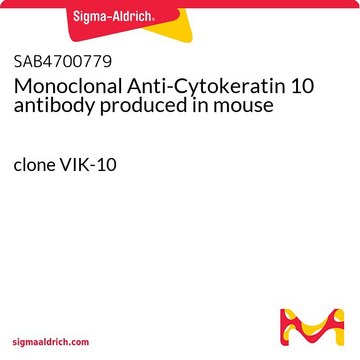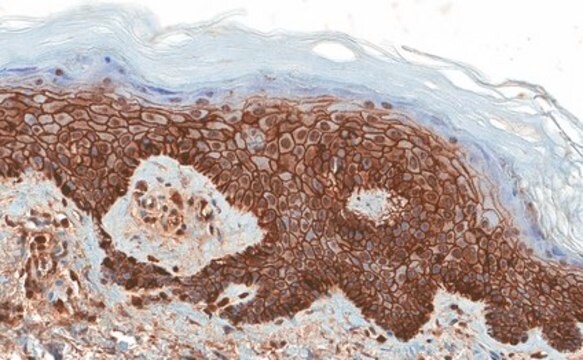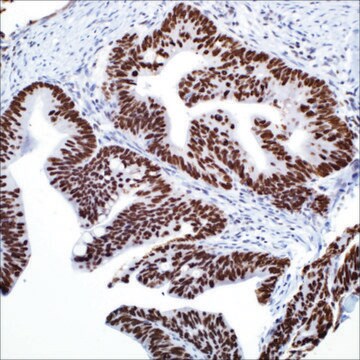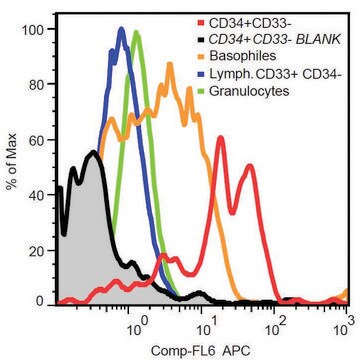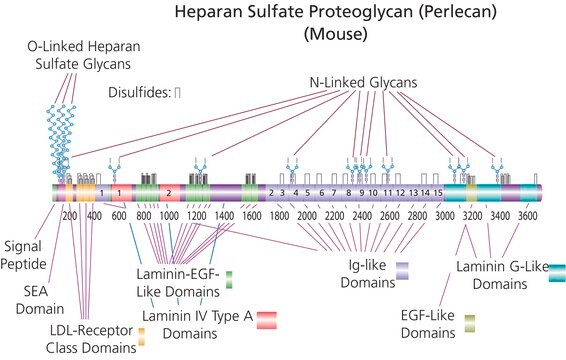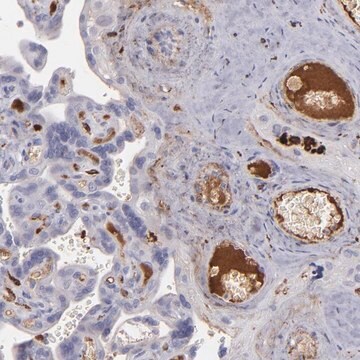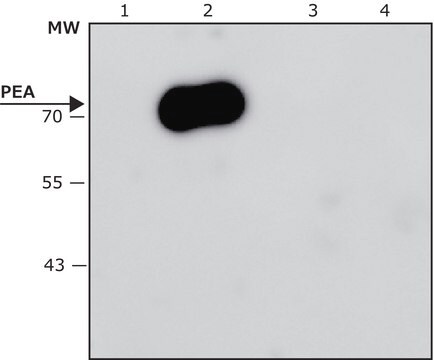SAB4700432
Monoclonal Anti-CD46-PE antibody produced in mouse
clone MEM-258, purified immunoglobulin, buffered aqueous solution
Synonym(s):
Anti-Membrane Cofactor Protein
Sign Into View Organizational & Contract Pricing
All Photos(1)
About This Item
UNSPSC Code:
12352203
NACRES:
NA.44
Recommended Products
biological source
mouse
Quality Level
conjugate
phycoerythrin (R-PE) conjugate
antibody form
purified immunoglobulin
antibody product type
primary antibodies
clone
MEM-258, monoclonal
form
buffered aqueous solution
species reactivity
bovine, human
technique(s)
flow cytometry: suitable
isotype
IgG1
NCBI accession no.
UniProt accession no.
shipped in
wet ice
storage temp.
2-8°C
target post-translational modification
unmodified
Gene Information
human ... CD46(4179)
General description
The antibody MEM-258 recognizes an epitope on SCR4 (the membrane-proximal SCR) domain of CD46 (Membrane cofactor protein). CD46 is 56-66 kDa dimeric transmembrane protein expressed on T and B lymphocytes, platelets, monocytes, granulocytes, endothelial cells, epithelial cells and fibroblast; it is negative on erythrocytes.
The gene cluster of differentiation 46 (CD46) is localized in the regulators of complement activation gene cluster on human chromosome 1q32.2. The gene codes for a type 1 membrane bound protein called membrane cofactor protein (MCP). The encoded protein is characterized with an intracellular tail region with several variant structures such as, a single transmembrane α-helical region, a short region of unknown function (U), a collar STP-rich region and finally four extracellular complement control protein (CCP) domains involved in the cofactor activity. MCP is ubiquitously expressed.
Immunogen
HPB-ALL human T cell line
Application
The reagent is designed for Flow Cytometry analysis of human blood cells using 20 μL reagent / 100 μL of whole blood or 1e6 cells in a suspension. The content of a vial (2 mL) is sufficient for 100 tests.
Biochem/physiol Actions
Membrane cofactor protein (MCP) acts as a complement regulator and protects the cells from autologous complement-mediated damage. It plays a major role in inhibition of alternative pathway (AP), lectin pathway (LP) and classical pathway (CP). In addition, it also acts as a cellular receptor for certain pathogens such as the measles virus (Edmonston strain), human herpesvirus 6 and Neisseria gonorrhoeae. The encoded protein facilitates the fertilization of the human egg. Mutations in the CD46 gene has been observed in patients with preeclampsia and atypical hemolytic uremic syndrome (aHUS).
Features and Benefits
Evaluate our antibodies with complete peace of mind. If the antibody does not perform in your application, we will issue a full credit or replacement antibody. Learn more.
Physical form
Solution in phosphate buffered saline containing 15 mM sodium azide and 0.2% high-grade protease free BSA as a stabilizing agent.
Disclaimer
Unless otherwise stated in our catalog or other company documentation accompanying the product(s), our products are intended for research use only and are not to be used for any other purpose, which includes but is not limited to, unauthorized commercial uses, in vitro diagnostic uses, ex vivo or in vivo therapeutic uses or any type of consumption or application to humans or animals.
Not finding the right product?
Try our Product Selector Tool.
Storage Class
10 - Combustible liquids
wgk_germany
WGK 2
flash_point_f
Not applicable
flash_point_c
Not applicable
Choose from one of the most recent versions:
Already Own This Product?
Find documentation for the products that you have recently purchased in the Document Library.
Human Membrane Cofactor Protein (CD46) Acts as a Cellular Receptor for Measles Virus
Naniche D.
Journal of Virology, 67, 6025-6032 (1993)
Genetic analysis of membrane cofactor protein (CD46) of the complement system in women with and without preeclamptic pregnancies.
Lokki AI
PLoS ONE, 10 (2015)
Unusual Clinical Severity of Complement Membrane Cofactor Protein?Associated Hemolytic-Uremic Syndrome and Uniparental Isodisomy
Fremeaux-Bacchi V
American Journal of Kidney Diseases, 49, 323-329 (2007)
Aleksei A Stepanenko et al.
Molecular therapy oncolytics, 24, 230-248 (2022-01-25)
Ad5-delta-24-RGD is currently the most clinically advanced recombinant adenovirus (rAd) for glioma therapy. We constructed a panel of fiber-modified rAds (Ad5RGD, Ad5/3, Ad5/35, Ad5/3RGD, and Ad5/35RGD, all harboring the delta-24 modification) and compared their infectivity, replication, reproduction, and cytolytic efficacy
Christoph Fleischli et al.
Journal of virology, 79(15), 10013-10022 (2005-07-15)
The human regulator of complement activation membrane cofactor protein (CD46) has recently been identified as an attachment receptor for most species B adenoviruses (Ads), including Ad type 3 (Ad3), Ad11, and Ad35, as well as species D Ad37. To characterize
Our team of scientists has experience in all areas of research including Life Science, Material Science, Chemical Synthesis, Chromatography, Analytical and many others.
Contact Technical Service